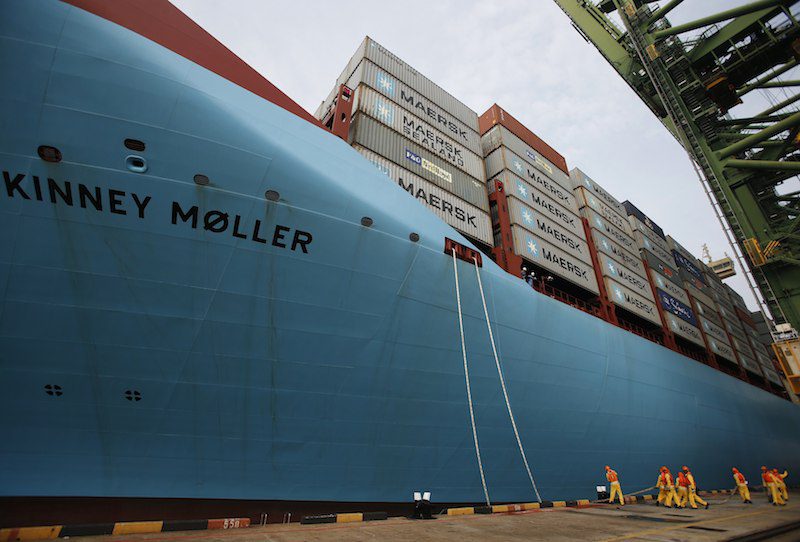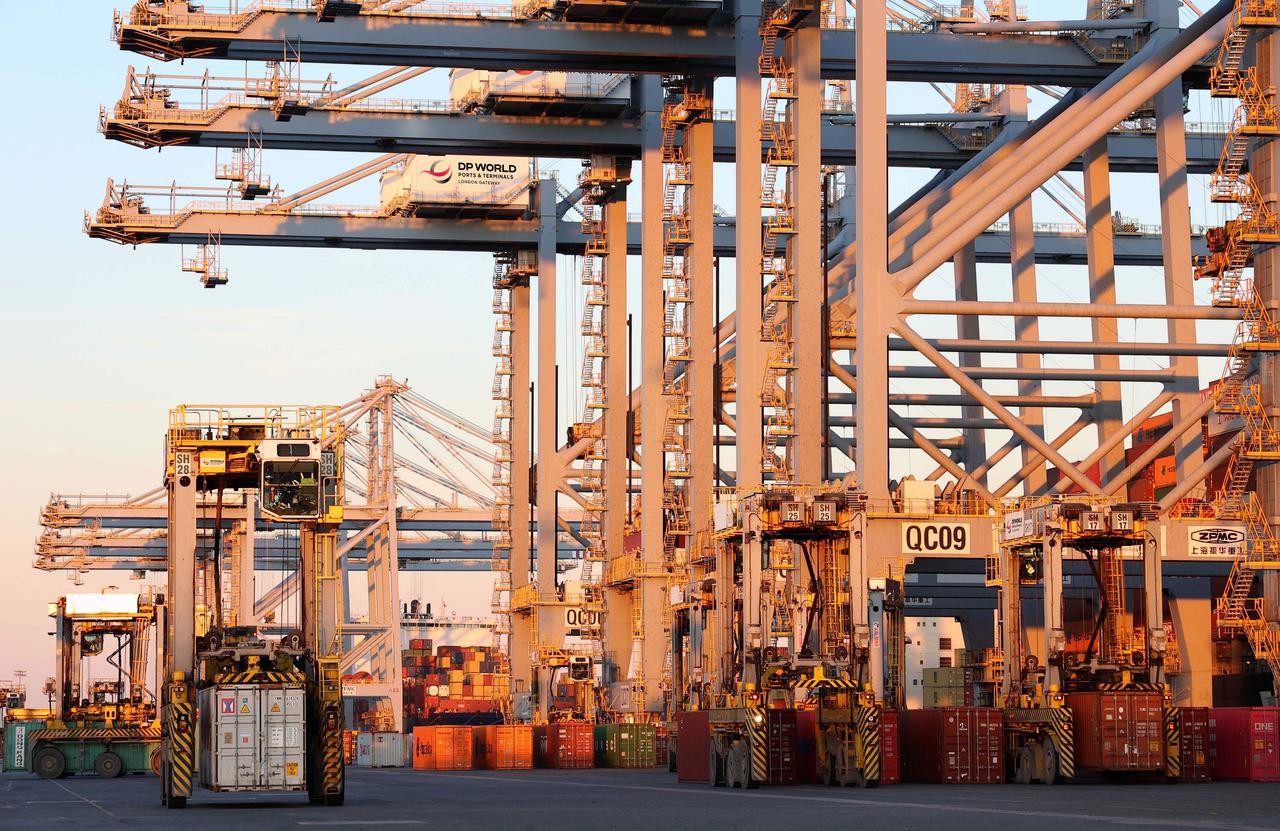Dock workers tie mooring ropes as the world’s largest container ship, the MV Maersk Mc-Kinney Moller. REUTERS/Edgar Su
 SHANGHAI, June 18 (Reuters) – China’s scuppering of a planned alliance of the world’s top three container shipping lines signals its protectionist stance on key industries and is a reminder to foreign firms to not take Beijing’s nod for granted on deals, analysts and lawyers said.
SHANGHAI, June 18 (Reuters) – China’s scuppering of a planned alliance of the world’s top three container shipping lines signals its protectionist stance on key industries and is a reminder to foreign firms to not take Beijing’s nod for granted on deals, analysts and lawyers said.
China’s Ministry of Commerce (MOFCOM) said on Tuesday it would not approve the P3 ship-pooling network, a plan dreamt up last year by Denmark’s A.P. Moller-Maersk, Swiss firm Mediterranean Shipping Co (MSC) and France’s CMA CGM , due to competition concerns.
Its rejection marks the first time China has blocked a deal proposed by foreign firms since its anti-monopoly regulator was granted greater powers six years ago, and indicates a keenness to protect local shipping interests when an approval could have been better for the wider industry, analysts said.
“China’s rejection of the P3 is likely more an effort to insulate Chinese domestic shipping companies…from competing with a more effective rival than it is an effort to maintain industry fair play, in our view,” Barclays analyst Jon Windham said.
“The best hope for improved industry earnings in the long-term was from consolidation. China’s rejection of the P3 is not a positive step in that direction,” he said.
MOFCOM did not immediately respond to a faxed query by Reuters.
The three firms had hoped to pool about 250 ships together on three trade routes, including Asia-Europe, helping them to cut costs and increase efficiencies at a time when the global shipping industry is battling overcapacity. The plan had already been approved by United States and European regulators.
Should it have succeeded, P3 would have handled more than 40 percent of Asia-Europe and trans-Atlantic trade, posing greater competition to China’s state-backed shippers China COSCO and China Shipping Container Lines (CSCL) .
STIFLING COMPETITION
China’s goods trade topped the $4 trillion mark last year, allowing it to overtake the United States as the world’s largest trading nation just 13 years after joining the World Trade Organisation.
Its shipping industry, however, has been fighting a capacity overhang since the global financial crisis after new vessels ordered earlier flooded the market, pushing down freight rates that have led COSCO and CSCL to report deep losses.
MOFCOM said on Tuesday one of the reasons it had blocked the alliance was that it would have significantly boosted the firms’s joint market share to 47 percent on the Asia-Europe service route, even though each had already held a substantial share.
It also said that it had held several talks with the companies to discuss how the companies might alleviate the alliance’s impact on competition, but in the end were not sufficiently convinced by their proposals.
Ahead of the decision, local groups such as the China Shippers’ Association (CSA) had lobbied the government against approving the alliance, arguing that it would give the firms too much market power and stifle competition.
“We’re very happy, we think it’s a fair result,” Cai Jiangxiang, CSA’s vice-chairman, told Reuters. “All the small and medium firms are very happy because they were worried about being squeezed out by P3 from the market.”
CRUCIAL INDUSTRY
Up to last year, MOFCOM reviewed 740 merger proposals, blocking one – Coca-Cola’s bid to buy top juice maker Huiyuan – and imposing conditions on 22 others.
In April the U.S. Chamber of Commerce sent a letter to U.S. Secretary of State John Kerry and Treasury Secretary Jacob Lew, urging Washington to get tough with Beijing on its use of anti-competition rules, noting that “concerns among U.S. companies are intensifying”.
P3, which was not strictly a merger as it would have been an independently operated network, won approval from the U.S. Federal Commission in March and was cleared by European antitrust regulators this month.
Shang Ming, MOFCOM’s anti-monopoly bureau director-general, told reporters in February, that mergers involving several jurisdictions are not already viewed in the same way by all related parties.
“You can’t say that if there’s not a problem in another jurisdiction, then there won’t be a problem in China,” he said.
Lawyers said the move by MOFCOM did not come as a surprise and that China has repeatedly intervened when there were concerns over negative impact on its local industries.
“This is about an industry which is very important for China, which is the manufacturing powerhouse of the world. It is very important that shipping remains competitive and shipping rates remain low to allow Chinese producers to export their goods,” said Marc Waha, an anti-trust lawyer at Norton Rose Fulbright.
“It is a very strong signal to the shipping industry that they need to be careful because China is adopting a more stringent approach.” (Additional reporting by Keith Wallis and Saeed Azhar in SINGAPORE, Matthew Miller in BEIJING; Reporting by Shanghai newsroom; Writing by Brenda Goh; Editing by Kazunori Takada and Muralikumar Anantharaman)
© 2014 Thomson Reuters. All rights reserved.

 Join The Club
Join The Club











